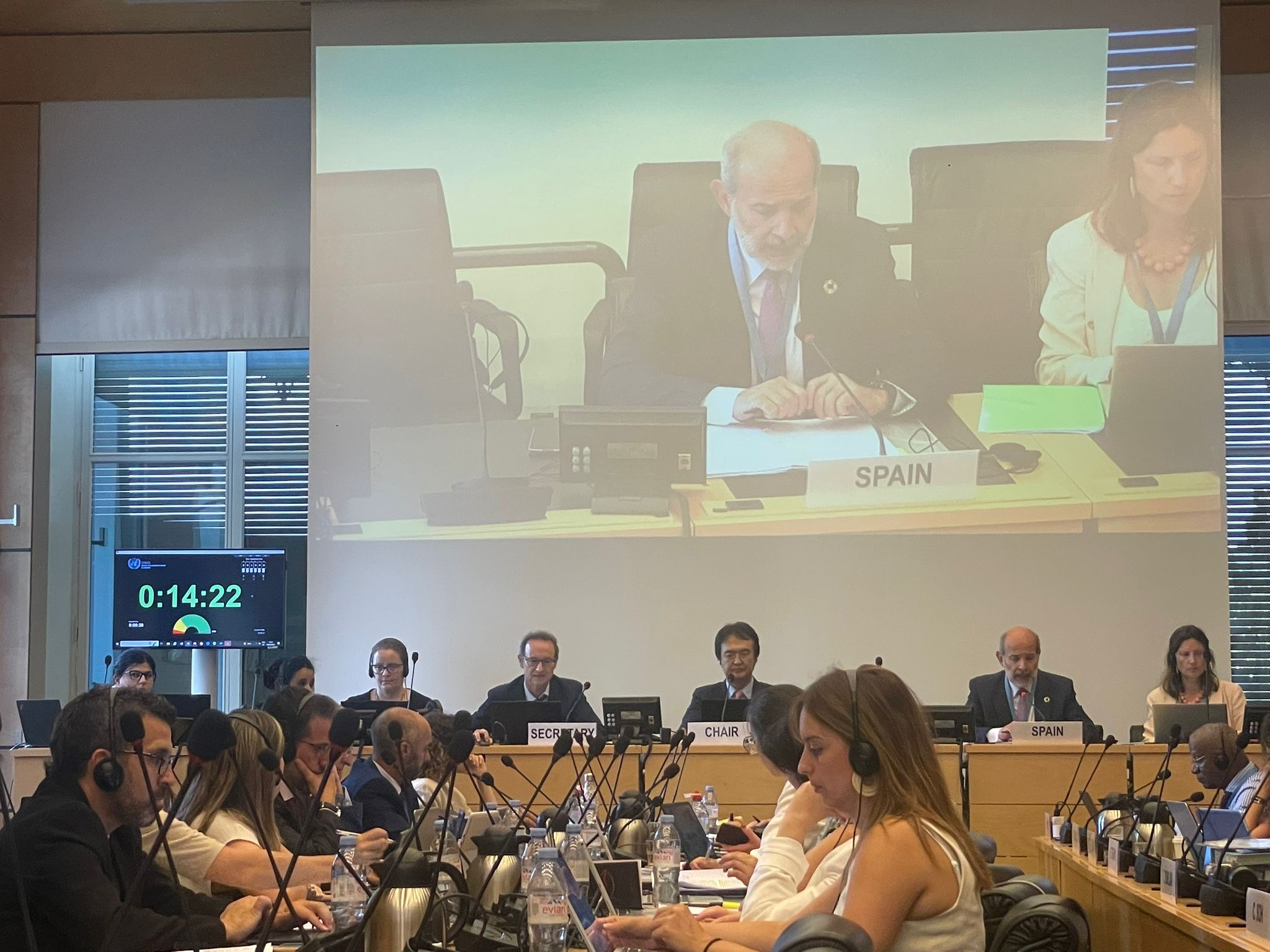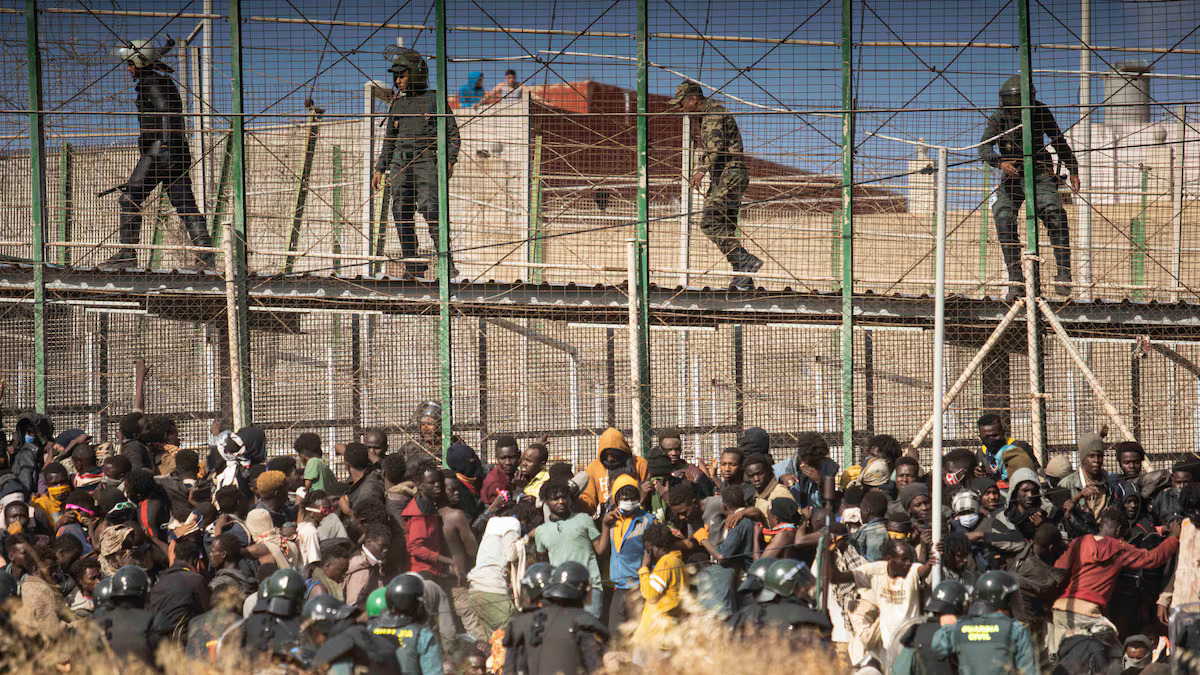Spain called out by the Committee for discrimination and treatment of migrants
Published on 28 Jul 2025, 12:12 PM
The Human Rights Committee reviews Spain in a dialogue focused on discrimination and the treatment of migrants
.jpg) Riot police officers after the arrival of migrants in Melilla, Spain, on June 24, 2022. Author: EPV
Riot police officers after the arrival of migrants in Melilla, Spain, on June 24, 2022. Author: EPV
On July 2 and 3, 2025, the Human Rights Committee examined Spain's seventh periodic report on its implementation of the International Covenant on Civil and Political Rights (ICCPR) with the State delegation. The delegation was chaired by Mr. Marcos Gómez Martínez, Spain's ambassador to the UN. In addition, it had a female majority and was composed almost exclusively of officials from various government ministries representing areas such as Foreign Affairs, Justice, Interior, Equality, Health, Inclusion, Youth, and Children.
The dialogue focused heavily on the Committee's concerns about the persistence of racism and discrimination in Spain, especially toward migrants and racialized communities. In a country with a significant and growing foreign population, both because it is Europe's southern border and because of its historical ties to Latin America, the Committee focused much of its questioning on the impact of restrictive migration policies, the use of racial profiling by security forces, conditions in detention centers, and barriers to access to basic rights. This sustained attention revealed the need for stronger responses from the State.
Migrants, asylum seekers, and refugees
The Committee expressed concern about the situation of migrants, asylum seekers, and refugees in Spain, particularly regarding conditions in detention centers (CIE and CETI) and access to justice for those in an irregular situation. The Committee also expressed concern about pushbacks at the borders of Ceuta and Melilla, warning of the lack of procedural guarantees. The tragedies of Tarajal in 2014 and Melilla in 2022 were mentioned as examples of situations that require accountability.
The Spanish delegation stated that conditions in the CIE and CETI have improved and that people in an irregular situation can access justice, especially in cases of trafficking or violence. With regard to the right to asylum, the delegation highlighted that the number of applications for international protection has increased significantly in recent years, reaching more than 160,000 in 2023, which has posed a challenge for the system, and pointed out that administrative resources have been strengthened to speed up processing.
The delegation also defended the legality of the border rejection procedure provided for in the Immigration Law and assured that it is applied in accordance with the principle of non-refoulement and the case law of the European Court of Human Rights. It added that mechanisms are in place to identify situations of vulnerability and that police actions are carried out under judicial supervision. Regarding the incident in Melilla in 2022, the actions of the security forces were defended, stating that they were proportionate and coordinated with the Moroccan authorities in response to a massive and violent attempt to enter the country.
Tensions over freedom of expression with Catalangate and the Ley Mordaza
Another concern raised by the Committee was the violation of freedom of expression and assembly, referring to the Catalangate case, in which the National Intelligence Center (CNI) allegedly used Pegasus spyware to monitor Catalan political leaders and pro-independence activists. It also questioned police infiltration of social movements without judicial authorization, noting that none of these incidents had been subject to effective investigation. Finally, concern was expressed about the impact of the Citizen Security Law (known as the “gag law”), considering that it has been used to punish peaceful protests and restrict the work of journalists and human rights defenders.
In response, the Spanish delegation stated that all communications interception, including that carried out by the CNI, is subject to prior judicial authorization and is under the control of a Supreme Court judge. With regard to police infiltration of social movements, no details were provided on specific cases, but it was reiterated that police actions must comply with the legal framework and are subject to judicial control. As for the Public Safety Law, the State defended that it is applied in accordance with the principles of legality and proportionality, and highlighted that it is currently under parliamentary review.
Democratic memory and transitional justice for the crimes of Francoism
 Spanish Delegation at Palais Wilson, Geneva.
Spanish Delegation at Palais Wilson, Geneva.
Finally, the Committee addressed the validity of the 1977 Amnesty Law (Pacto del Olvido), which not only allowed for the release of political prisoners from the dictatorship, but also granted amnesty to officials involved in human rights violations during the Franco regime. It pointed out its possible incompatibility with international standards and asked the Spanish delegation whether its repeal is planned and how it currently interacts with the 2022 Democratic Memory Law. The Committee also expressed concern about the existence of regional laws that could contradict the state law on democratic memory.
In response, the Spanish delegation stated that there are no plans to repeal the 1977 Amnesty Law, arguing that it was the result of a broad political consensus during the transition and that its objective was to facilitate national reconciliation. It explained that this law can coexist with the 2022 Democratic Memory Law, as the latter requires all laws to be interpreted in accordance with international law. However, in practice, Spanish courts have continued to dismiss cases on the grounds of statute of limitations, criminal non-retroactivity, or lack of criminalization at the time of the events. In this context, it was noted that a Human Rights and Democratic Memory Prosecutor's Office has been created and is already investigating cases. Regarding regional laws that could contradict the state framework, he reported that they have been challenged before the Constitutional Court and that their application is suspended until their legality is resolved.
Watch the review session again here (day 1) and here (day 2).
Disclaimer: Transcripts of the dialogue available here powered by WIPO Speech-to-Text served as the main source of the presented article. While all the information was carefully checked, please refer to the audio or UN WebTV for an official version of the dialogue.
Recommendations of the Human Rights Committee
The Concluding Observations on Spain's fourth periodic report were released on 18th July 2025. The State party is requested to provide, by 18th July 2028, information on the following recommendations:
Non-discrimination
The Committee recommended that Spain redouble its efforts to combat racism, xenophobia, and racial and ethnic profiling by strengthening its legislative, institutional, and public policy frameworks. In particular:
- (a) Accelerate the adoption of the law against racism and related forms of intolerance;
- (b) Ensure that the Independent Authority for Equality has the necessary resources, independence, and mandate;
- (c) Adopt concrete measures to eliminate racial profiling, including its explicit legal prohibition;
- (d) Guarantee transparent accountability mechanisms with data accessible to the public; and
- (e) Intensify police training against profiling, monitoring its effectiveness through data on arrests and searches.
Hate speech and hate crimes
The Committee urged Spain to step up its fight against hate crimes and hate speech, as well as incitement to discrimination or violence on grounds of race, ethnicity, religion, sexual orientation, or gender identity. In particular:
- (a) Strengthen public awareness of human rights and tolerance, combating stereotypical prejudices;
- (b) Encourage the reporting of hate crimes, ensure their investigation and punishment, and guarantee effective redress for victims;
- (c) Compile disaggregated statistics that differentiate between hate crimes, hate speech, and other forms of discrimination, including ideological motivation and the religious group affected;
- (d) Strengthen cooperation with civil society and provide adequate training to authorities, law enforcement agencies, judges, prosecutors, and the media to prevent and combat these phenomena.
Treatment of foreigners, including refugees and asylum seekers
The Committee recommended that Spain redouble its efforts to improve the asylum system and reception conditions. In particular:
- (a) Urgently increase the capacity to process applications for international protection and ensure their reception, registration, and immediate transfer to the competent authorities;
- (b) Establish a unified regulatory framework for temporary care centers and ensure that conditions in reception centers comply with international standards;
- (c) Promote alternatives to administrative detention and, while it remains in place, improve living conditions in the CIE to ensure an adequate standard of living and access to basic services.
Here, you can find all the recommendations given by the Committee in the Concluding Observations.
The follow-up report of Spain on the implementation of recommendations is due in 2028. The next list of issues will be adopted in 2031, and the next periodic report is due in 2032.
.jpg) Riot police officers after the arrival of migrants in Melilla, Spain, on June 24, 2022. Author: EPV
Riot police officers after the arrival of migrants in Melilla, Spain, on June 24, 2022. Author: EPV


